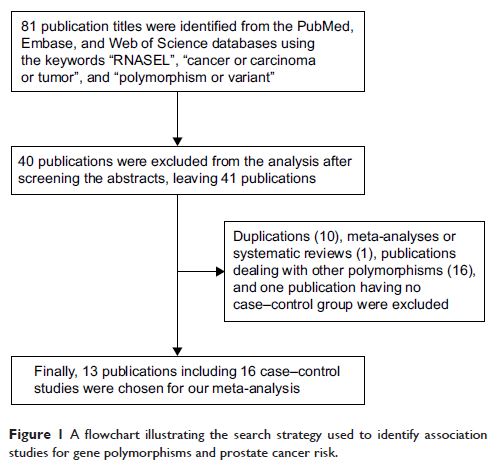108985
论文已发表
注册即可获取德孚的最新动态
IF 收录期刊
- 3.4 Breast Cancer (Dove Med Press)
- 3.2 Clin Epidemiol
- 2.6 Cancer Manag Res
- 2.9 Infect Drug Resist
- 3.7 Clin Interv Aging
- 5.1 Drug Des Dev Ther
- 3.1 Int J Chronic Obstr
- 6.6 Int J Nanomed
- 2.6 Int J Women's Health
- 2.9 Neuropsych Dis Treat
- 2.8 OncoTargets Ther
- 2.0 Patient Prefer Adher
- 2.2 Ther Clin Risk Manag
- 2.5 J Pain Res
- 3.0 Diabet Metab Synd Ob
- 3.2 Psychol Res Behav Ma
- 3.4 Nat Sci Sleep
- 1.8 Pharmgenomics Pers Med
- 2.0 Risk Manag Healthc Policy
- 4.1 J Inflamm Res
- 2.0 Int J Gen Med
- 3.4 J Hepatocell Carcinoma
- 3.0 J Asthma Allergy
- 2.2 Clin Cosmet Investig Dermatol
- 2.4 J Multidiscip Healthc

RNASEL-1385G/A 多态性与非洲人患前列腺癌的风险相关
Authors Liu X, Zheng D, Lu G, Yang B
Received 11 September 2017
Accepted for publication 21 November 2017
Published 22 December 2017 Volume 2018:11 Pages 97—102
DOI https://doi.org/10.2147/OTT.S151398
Checked for plagiarism Yes
Review by Single-blind
Peer reviewers approved by Dr Colin Mak
Peer reviewer comments 3
Editor who approved publication: Dr William Cho
Abstract: The RNASEL –1385G/A (rs486907) variant has been reported to be
associated with increased risk of prostate cancer. However, these associations
are not consistent among studies. To address this issue, we performed a
meta-analysis to evaluate the association between RNASEL –1385G/A polymorphism
and prostate cancer risk. The PubMed, Embase, and Web of Science databases were
searched for relevant papers published in the past 20 years from 1997 to
2017. Odds ratios (ORs) and 95% confidence intervals (CIs) were used to assess
the strength of associations. Based on our search for manuscripts reporting
prostate cancer susceptibility related to the rs486907 polymorphism, 16 case–control
studies from 13 different publications were retrieved. No significantly
positive associations were found for the polymorphism and prostate cancer
susceptibility in the total population. When stratified by ethnicity, the
results demonstrated that the –1385G/A polymorphism was associated with a
decreased cancer risk in Africans (GG vs AA: OR =0.371, 95% CI =0.176–0.783;
GG/GA vs AA: OR =0.368, 95% CI =0.175–0.776). We also found that the
rs486907 polymorphism was associated with a decreased cancer risk in
hospital-based controls (GG vs AA: OR =0.697, 95% CI =0.488–0.996; GG + GA vs
AA: OR =0.701, 95% CI =0.502–0.978). Our meta-analysis suggests that
polymorphism in the RNASEL gene is a protective factor against prostate cancer
in Africans. Further studies using larger sample sizes should be conducted to
elucidate the role of gene polymorphism in prostate cancer risk.
Keywords: RNASEL,
prostate cancer, polymorphism, meta-analysis
